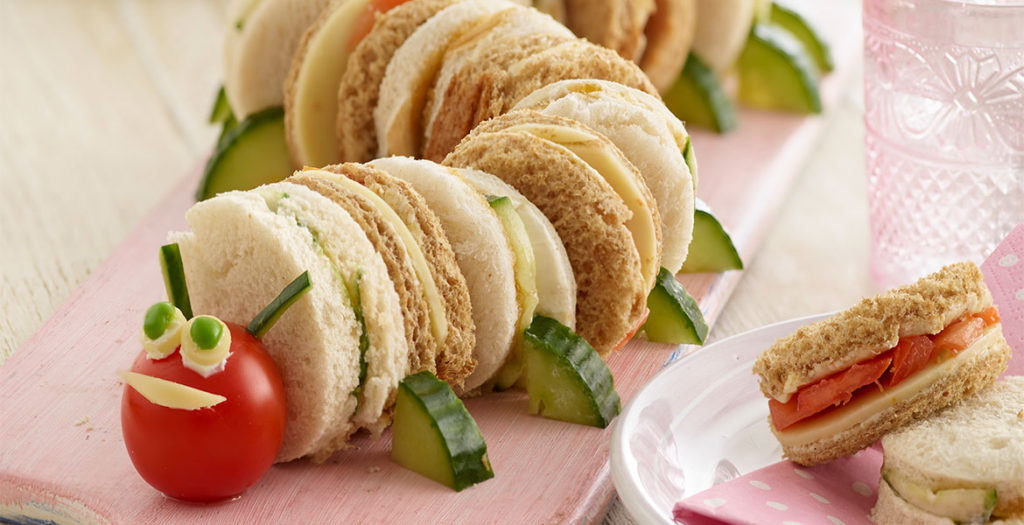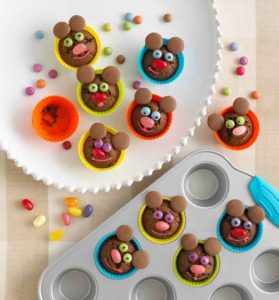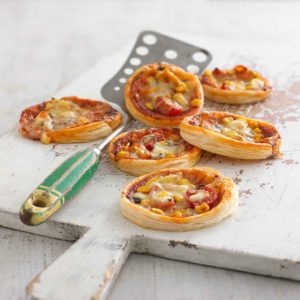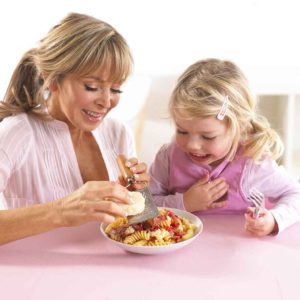
From their first bite of ‘real’ food, your little one starts on an amazing journey of taste and texture. How do you get your little one interested in cooking with you and sow the seeds for a lifetime of the love of cooking?
With Annabel Karmel
From the most eager of eaters to the faddiest of little foodies, children of all ages can benefit from spending time in the kitchen. From peeling to grating, mixing and rolling, there are lots of simple tasks for tiny hands.
Some of my happiest memories are of my children cooking. It was a great way to spend quality time together and I loved watching their faces peering through the oven door, waiting for their cakes to rise or their jacket potatoes to crisp.
 You’ll stand a good chance of instilling a love of good, healthy food when preparing simple meals together from scratch. It doesn’t need to be complicated or time- consuming, so a tasty sultana muffin or a ham and cheese omelette is a really great place to start.
You’ll stand a good chance of instilling a love of good, healthy food when preparing simple meals together from scratch. It doesn’t need to be complicated or time- consuming, so a tasty sultana muffin or a ham and cheese omelette is a really great place to start.
We all know that kids love to ask questions; they’re naturally inquisitive and want to explore the world around them. My three children would always ask me about everything and anything! Their thirst for knowledge never ceased to amaze me. That’s why I fed their curiosity in the kitchen, which worked wonders – although I quickly learned that their enthusiasm waned when it came to the washing up!
There isn’t a ‘best before’ date on learning how to cook and whilst starting young equips children with the knowledge and skill to make good food choices as they grow-up, it’s never too late to learn good habits. So how can you have a cracking time in the kitchen?
Early birds
Kids can join you in the kitchen earlier than you might think. Whether it’s counting out ingredients or washing them, cracking eggs or rolling dough, little ones can give you a helping hand. Give them bowls of lots of various ingredients and let them start to explore.

Keep it simple
Children (especially toddlers) have short attention spans, so start with recipes that are extra easy and provide a result reasonably quickly. My Hungry Caterpillar sandwich is a simple recipe and pancakes, omelettes and cupcakes are easy too.
Get messy
Let’s face it; cooking with kids is never going to be mess free. Spending time in the kitchen with different smells, sights and textures should be a fun and memorable experience, so don’t worry about a bit of mess. Make sure you both wear aprons or old clothes and use plastic tablecloths to make tidying up easier. Trust me: sticky ingredients like chocolate get just about everywhere!
Food art
Unleash their inner Picasso by allowing your children to get creative with their edible masterpieces. Use different colour vegetables to create faces on pizza bases or decorate sweet little cupcakes with icing and sweets to make fun characters or animals.
Food trivia
It’s important to introduce as many foods as possible at an early age. Try playing a game and blindfold each child before introducing a new food and ask them to guess what it is. Giving them facts is likely to make them more interested about what they are eating.
Squabble free fun
If you are cooking with more than one child, give each of them their own job or spoon to stir. Yes, it’s important to encourage sharing, but they also want their own responsibilities. It also stops sibling squabbles.

Healthy favourites
Try making ‘healthy junk food’ using good quality lean meat for burgers and English muffins for pizza bases. A good way to coat homemade fish fingers is to dip them in seasoned our, beaten egg and crushed corn flakes.
Safety first
Kids love to copy grown-ups, so make sure you set a good example when you’re in the kitchen. Always wash your hands before cooking and help your little ones to do the same, to teach good hygiene. Getting children to take an active interest in what they’re eating is essential for their general health and wellbeing.
And if you have a fussy eater, they’re far more likely to eat something they’ve prepared themselves than something you’ve put in front of them.
My ethos is that we parents need to help give our children a positive relationship with food and that means letting them help out in the kitchen. Yes it be might be messy or chaotic and their enthusiasm might disappear half way through a recipe, but believe me they’ll always be back to eat the goods at the end.
